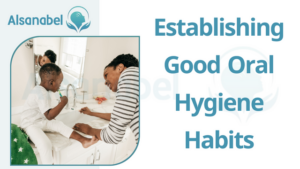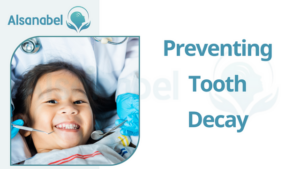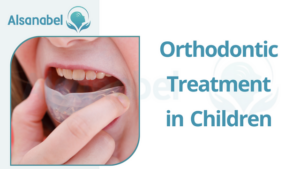Dental health is an essential aspect of overall well-being, and it is crucial to start taking care of oral hygiene from a young age. Good dental habits established in childhood can have long-lasting effects on a child’s oral health as they grow into adulthood. In this blog, we will discuss the importance of dental health in childhood and common dental problems that children often face.
Common Dental Problems in Children
Several dental problems are commonly found in children. One of the most common issues is tooth decay. Tooth decay occurs when bacteria in the mouth produce acids that damage the tooth enamel. This can result in cavities and toothaches. Another common dental problem is malocclusion, which refers to misalignment of the teeth or jaws.
Malocclusion can lead to difficulties in biting and chewing, speech problems, and self-esteem issues. Additionally, gum disease, such as gingivitis, can occur in children. This condition causes inflammation and bleeding of the gums. Regular dental check-ups and proper oral hygiene practices can help prevent and address these dental problems in children.
In conclusion, prioritizing dental health in childhood is crucial for long-term oral well-being. By instilling good dental habits in children and addressing common dental problems, we can ensure that they have a healthy and confident smile as they grow. Regular Good dental clinic in Qatar check-ups, proper brushing and flossing, and a balanced diet can all contribute to improving dental health in childhood.
Establishing Good Oral Hygiene Habits

Teaching children proper brushing techniques
One of the most important aspects of improving dental health in childhood is teaching children proper brushing techniques. It is essential to educate children on the correct way to brush their teeth.
Parents should start by demonstrating the right technique themselves and then guide their children through the process. They should instruct children to brush their teeth twice a day for at least two minutes each time. Additionally, parents should emphasize the importance of using a soft-bristled toothbrush and fluoride toothpaste. Teaching children to brush in small circular motions and reaching all surfaces of the teeth is crucial for thorough cleaning.
Parents can also make brushing more enjoyable for children by providing them with fun and colorful toothbrushes and toothpaste. They can play their children’s favorite songs or use a timer to make brushing time more engaging. This way, children will develop a positive attitude towards oral hygiene and be more motivated to maintain good dental habits.
The role of parents in oral hygiene
Parents play a significant role in establishing good oral hygiene habits in their children. They should take the lead and be a role model by practicing good dental habits themselves. Children often imitate their parents’ behavior, so seeing their parents prioritize oral hygiene will encourage them to do the same.
In addition to being role models, parents should also supervise and assist their children while brushing their teeth until they are old enough to do it independently. This ensures that children are brushing properly and for the recommended amount of time. Parents should also keep track of their children’s Dental clinic Qatar appointments and schedule regular check-ups to monitor their dental health. By taking an active role in their children’s oral hygiene, parents can prevent dental problems and instill good habits that will benefit their children’s overall well-being.
Nutrition and Dental Health
Effects of Sugary Foods on Teeth
It is no secret that excessive consumption of sugary foods and drinks can have detrimental effects on dental health, especially in childhood. When children consume sugary snacks and beverages, the bacteria in their mouth feed on the sugar and produce acid as a byproduct. This acid attacks the tooth enamel, leading to tooth decay and cavities. Over time, if left unchecked, this can cause more serious dental problems, such as gum disease and tooth loss.
To promote better dental health, it is important to limit the intake of sugary foods and drinks. Encourage children to choose healthier alternatives, such as fresh fruits and vegetables, dairy products like cheese and yogurt, and water instead of sugary sodas or juices. Limiting the consumption of sugary snacks to meal times can also help minimize the negative impact on teeth.
Foods that Promote Dental Health
In addition to avoiding sugary foods, there are several foods that can actually promote dental health in children. Foods rich in calcium, such as milk, cheese, and yogurt, are excellent choices as they help strengthen tooth enamel. These dairy products also contain casein, a protein that helps prevent erosion of the teeth.
Crunchy fruits and vegetables, like apples and carrots, can stimulate saliva production, which helps wash away food particles and neutralize acid in the mouth. Leafy greens, such as spinach and kale, are packed with nutrients like calcium and folic acid, which are beneficial for oral health.
Another important nutrient for dental health is vitamin C. Citrus fruits, strawberries, and bell peppers are examples of foods high in vitamin C, which helps promote healthy gums and prevent gum disease.
Including these dental-friendly foods in a child’s diet, along with regular brushing and flossing, can go a long way in improving their dental health. It is essential for parents to educate their children about the importance of nutrition and dental hygiene, creating healthy habits that will last a lifetime.
By being mindful of the effects of sugary foods on teeth and incorporating foods that promote dental health, parents can play a crucial role in improving their child’s dental health and setting them up for a lifetime of healthy smiles.
Regular Dental Check-ups
The importance of regular dental visits
Regular Best dental care in Qatar check-ups are essential for maintaining good oral health in childhood. These routine visits to the dentist allow for early detection and prevention of dental problems, ensuring that any issues are addressed before they become more serious. Here are a few reasons why regular dental check-ups are important for children:
- Early detection of dental issues: Dentists are trained to identify potential dental problems that may not be visible to the naked eye. This includes issues such as tooth decay, gum disease, and misalignment of the teeth. By catching these issues early on, treatment can be provided promptly, preventing further damage and discomfort.
- Prevention of future dental problems: In addition to detecting existing dental issues, regular check-ups allow dentists to provide preventive measures to avoid future problems. This may include applying dental sealants to protect the teeth from decay, providing fluoride treatments to strengthen the enamel, and recommending orthodontic treatments to correct any misalignment.
- Education and guidance: Dental check-ups offer an opportunity for dentists to educate both children and parents on proper oral hygiene practices. They can provide guidance on effective brushing and flossing techniques, as well as offer advice on healthy nutrition choices that promote good dental health. This helps children develop lifelong habits that will serve them well in maintaining healthy teeth and gums.
What to expect during a dental check-up
During a regular dental check-up, the Best dentist Qatar will perform a thorough examination of the child’s teeth, gums, and mouth. They may use a small mirror and a dental explorer to check for any signs of decay or other dental issues. X-rays may also be taken to get a more detailed view of the teeth and jaw.
The dentist will also assess the child’s bite and jaw alignment, as well as look for any signs of teeth grinding or clenching. They may clean the teeth to remove any plaque or tartar buildup, and provide a fluoride treatment to strengthen the enamel.
The dentist will discuss any findings or concerns with the child and their parents, providing recommendations for treatment or further preventive measures if necessary.
In conclusion, regular Dental clinic Qatar check-ups are crucial for maintaining optimal dental health in childhood. By attending these visits, children can receive the necessary care and guidance to prevent and address any dental issues, setting them up for a lifetime of healthy smiles.
Preventing Tooth Decay

Fluoride and its role in preventing tooth decay
Fluoride is a mineral that plays a crucial role in preventing tooth decay, particularly in children. It helps to strengthen tooth enamel, making it more resistant to acid attacks from bacteria and sugary foods. Incorporating fluoride into a child’s dental health care routine can significantly reduce the risk of tooth decay.
There are several ways to ensure that children receive an adequate amount of fluoride. One of the most common methods is using fluoridated toothpaste. When brushing their teeth, children should use a pea-sized amount of toothpaste that contains fluoride. It is essential to teach children to spit out the toothpaste after brushing instead of swallowing it.
Fluoridated water is also an excellent source of fluoride. Many communities have fluoride added to their water supply to promote dental health. Drinking tap water can help strengthen tooth enamel and protect against cavities. If your tap water is not fluoridated, speak with a Best dentist Qatar about other fluoride options, such as fluoride supplements.
Sealants and their benefits
Dental sealants are another effective method for preventing tooth decay in children. These are thin, protective coatings that are applied to the chewing surfaces of the back teeth, where tooth decay often occurs. The sealants act as a barrier, preventing bacteria and food particles from getting trapped in the crevices of the teeth.
Sealants are usually applied to the permanent molars as soon as they erupt, which is typically between the ages of 6 and 12. The process is straightforward and painless. The dentist will clean the teeth, apply an acidic gel to roughen the surface, and then brush on the sealant material. A special blue light is used to harden the sealant quickly.
The benefits of dental sealants are numerous. They provide an extra layer of protection against tooth decay, reducing the risk of cavities by up to 80%. Sealants are long-lasting and can remain intact for several years with proper oral hygiene. They are cost-effective and can save both time and money by minimizing the need for more extensive dental treatments in the future.
By incorporating fluoride and sealants into a child’s dental care routine, parents can significantly improve their child’s dental health. Regular dental check-ups, along with these preventive measures, will ensure that children develop lifelong habits and enjoy optimal oral health.
The Role of Dental Education
Educating children about oral health through schools
Dental education plays a vital role in improving dental health in childhood. One effective way to achieve this is by incorporating oral health education into school curriculums. By teaching children about oral hygiene practices and the importance of dental care, schools can empower them to take charge of their own oral health.
Schools can invite dental professionals to conduct interactive sessions, workshops, and presentations to educate children about oral health. These sessions can cover essential topics such as proper brushing and flossing techniques, the importance of a balanced diet for dental health, and the risks of tooth decay and gum disease.
Dental education programs can also educate children about the impact of unhealthy habits like smoking and excessive sugar consumption on oral health.
Promoting good oral hygiene practices in schools
In addition to educating children about oral health, schools can also promote good oral hygiene practices in their daily routines. This can include implementing policies that encourage students to brush their teeth after meals, providing access to fluoridated water for drinking, and ensuring that students have regular access to Good dental clinic in Qatar check-ups.
Schools can create a supportive environment that fosters good oral hygiene habits. This can include setting up dental health corners at schools, providing toothbrushes and toothpaste for students, and organizing oral health awareness campaigns.
By making dental education a priority and promoting good oral hygiene practices in schools, we can significantly improve dental health in childhood. Children will develop early habits that will contribute to their oral health throughout their lives. With proper education and support, we can reduce the prevalence of tooth decay and gum disease, helping children maintain healthy smiles well into adulthood.
Remember, preventive measures like regular Dental clinic Qatar check-ups, fluoride use, and dental sealants are crucial components of maintaining optimal oral health in childhood. By combining these measures with dental education, we can ensure that children have the necessary knowledge and tools to keep their teeth and gums healthy for years to come.
Dealing with Dental Anxiety in Children
Tips for Reducing Dental Anxiety in Children
Dental anxiety is a common issue among children. The fear of the unknown, the unfamiliar environment, and the potential discomfort can make Best dentist Qatar visits a stressful experience. However, there are several strategies that parents and dental professionals can employ to help alleviate dental anxiety in children.
- Start Early: Introduce your child to the dental office at an early age. This helps familiarize them with the environment and builds a positive association with dental visits.
- Communication: Explain the dental procedure to your child in a simple and age-appropriate manner. Answer their questions honestly and reassure them that the dentist and dental team are there to help.
- Positive Reinforcement: Praise your child for their bravery and cooperation during dental visits. Rewards such as small treats or stickers can help create a positive association with dental appointments.
- Distraction: Provide distractions during the dental procedure to shift your child’s focus. This can be done through storytelling, playing their favorite music, or watching a favorite show on a tablet.
- Hire a Pediatric Dentist: Pediatric dentists specialize in treating children and are trained in techniques to alleviate dental anxiety. They create a child-friendly environment and use behavior management techniques to ensure a comfortable experience.
Pediatric Sedation Options
For children with severe dental anxiety or those requiring extensive dental treatment, pediatric sedation options may be necessary. These options can provide a relaxed and comfortable dental experience for children. Some common pediatric sedation methods include:
- Nitrous Oxide: Also known as laughing gas, nitrous oxide is a safe and effective sedation option. It is administered through a mask and helps relax the child during the dental procedure.
- Oral Sedation: This involves the use of an oral medication to induce a state of relaxation. The child remains awake but may feel drowsy during the procedure.
- IV Sedation: Intravenous (IV) sedation is administered through a vein and provides a deeper level of sedation. This method is commonly used for more extensive procedures or for children with severe anxiety.
It is important to consult with a pediatric Best dental care in Qatar to determine the most appropriate sedation option for your child. They will consider your child’s individual needs and medical history to ensure a safe and comfortable experience.
Orthodontic Treatment in Children
Orthodontic treatment in children plays a crucial role in improving dental health and ensuring a confident smile in the long run. Addressing orthodontic issues at an early age can prevent future complications and potentially reduce the need for more extensive treatment later on.

The benefits of early orthodontic intervention
Early orthodontic intervention, also known as interceptive orthodontics, focuses on identifying and treating orthodontic issues in children as soon as they arise. Here are some key benefits of early orthodontic treatment:
- Improved oral health: Orthodontic problems, such as misaligned teeth or jaw discrepancies, can increase the risk of tooth decay, gum disease, and other oral health issues. Early intervention helps correct these problems, promoting better oral health and hygiene.
- Enhanced facial aesthetics: Addressing orthodontic issues early on can help guide the growth and development of the jaw and facial structures. This can result in improved facial aesthetics and a balanced smile.
- Prevention of future problems: Correcting orthodontic issues in childhood can prevent future complications, such as overcrowding, protruding teeth, and bite problems. Early intervention can potentially reduce the need for more extensive and costly orthodontic treatment in the future.
Common orthodontic issues in children
Several common orthodontic issues can affect children’s dental health and development. Here are a few examples:
- Malocclusion: This refers to a misalignment of the teeth or jaws. It can manifest as crowded teeth, gaps between teeth, overbites, underbites, or crossbites.
- Crowding: Insufficient space in the mouth can cause teeth to overlap or become misaligned, leading to difficulties in proper oral hygiene and potential bite problems.
- Thumb-sucking: Prolonged thumb-sucking or pacifier use can result in improper alignment of the teeth and changes in the jawbone structure.
- Early loss of baby teeth: Premature loss of primary teeth can disrupt the eruption and alignment of permanent teeth.
Early intervention by an orthodontic specialist can address these issues and ensure proper dental development in children.
Tips for maintaining good dental health in childhood
- Establish a regular oral hygiene routine: Teach your child the importance of brushing their teeth twice a day with a fluoride toothpaste and flossing daily. Encourage them to develop good habits early on.
- Limit sugary snacks and drinks: Excessive consumption of sugary foods and drinks can contribute to tooth decay. Encourage healthy eating habits and limit sugary snacks and beverages, especially between meals.
- Encourage regular dental check-ups: Regular dental check-ups are essential for monitoring your child’s dental development and addressing any potential issues. Schedule appointments with a pediatric dentist or orthodontist.
- Protect teeth during sports: If your child participates in sports, make sure they wear a mouthguard to protect their teeth from injury. Consult with an orthodontist for a custom-fitted mouthguard.
- Address thumb-sucking or pacifier use: Prolonged thumb-sucking or pacifier use can affect dental development. Encourage your child to break these habits, and consult with an orthodontist if necessary.
- Lead by example: Show your child the importance of good dental health by practicing proper oral hygiene habits yourself. Brush and floss together, and make dental care a family affair.
By following these tips and seeking professional orthodontic care when needed, you can help your child maintain good dental health and prevent future complications. Remember, early intervention is key in addressing orthodontic issues and promoting optimal dental development. Establishing a strong foundation of dental health in childhood sets the stage for a lifetime of confident and healthy smiles.
